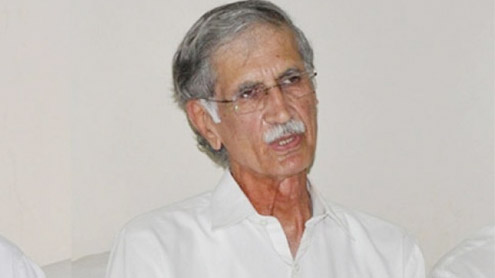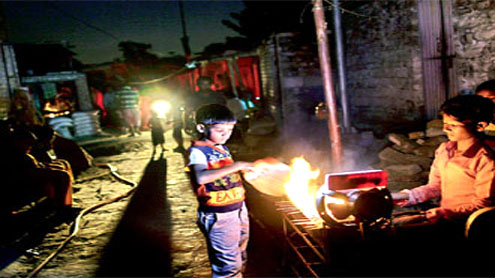
PESHAWAR: Members of the Khyber Pakhtunkhwa Assembly will get Rs20 million each in the next financial year for carrying out development schemes in their respective constituencies, negating Pakistan Tehreek-i-Insaf’s manifesto.
The provincial government’s annual development programme for the financial year 2013-14 will include an umbrella development project of Rs2.48 billion in continuation with the past, earmarking equal sum of money for every provincial lawmaker. The matter appears to be a hard nut to crack for the multi-party Khyber Pakhtunkhwa government. Two of its important parties, including Pakistan Tehreek-i-Insaf and Jamaat-i-Islami, are not on the same page in this respect.
“I don’t think there is anything like that, a decision to this effect has to be taken either by the Chief Minister or the provincial cabinet,” PTI provincial general secretary Shaukat Yousafzai, a member of the provincial assembly, told Media when contacted.The provincial minister for finance Sirajul Haq, a senior Jamaat-i-Islami leader, told a local newspaper on Thursday that the lawmakers would get Rs20 million each under the Tameer-i-Khyber Pakhtunkhwa programme for their constituency specific development activities.
Professor Mohammad Ibrahim, Jamaat-i-Islami’s chief, Khyber Pakhtunkhwa chapter, when approached, told media that the provincial lawmakers’ development fund was not being scrapped.“Their (MPAs’) role in the development works is not being done away with, it will be a team work and lawmakers would work cohesively,” said the JI leader.The issue of ending the culture of dolling out money to MPAs for development activities is of utmost significance for PTI. Its election manifesto promises to end umbrella development programmes and discretionary development funds for the chief executives (chief ministers) and lawmakers.
“There are things we as a party cannot go against,” said Mr Yousafzai, adding that PTI could not withdraw from its election promises.The abolition of the MPAs’ special development funds is not so simple to strike it down with a single stroke of pen from the programme from the annual development programme. It would require some ground work by the provincial government, making the MPAs agree to end the tradition.The programme has few opponents than supporters within the political parties representing the two sides of the provincial assembly.
Nighat Orakzai, a member of the provincial assembly from Pakistan People’s Party Parliamentarians, when contacted by media, termed the MPAs’ special development ‘very vital’ for the elected representatives.“All elected representatives need to consolidate their position in their respective constituencies,” said Ms Orakzai, adding that constituents expected their elected representatives to build schools, improve electricity lines, rebuild broken roads, fix water taps, and repair streets for which the MPAs’ development funds had been very helpful in the past.
Jamaat-i-Islami’s Professor Ibrahim said MPAs’ involvement in policy making matters was their job, pushing forward a government’s development agenda at the grassroots level.However, PTI has come up with a different take on the matter in its election manifesto, putting in unequivocal terms to ‘eliminate all discretionary funds and no development funds of parliamentarians.’Economic experts and senior bureaucrats term the PTI’s policy goal of great significance to improve development planning in Khyber Pakhtunkhwa.
Akmal Minallah, a public finance management consultant and an economic adviser to the Khyber Pakhtunkhwa government, when contacted, said the elimination of the MPAs’ development programme would leave room for achieving strategic thinking in the official development planning.“MPAs used to clear development schemes in their constituencies which would not be practiced in line with the PTI’s programme as the party is talking about taking resources to the grassroots level,” said Mr Minallah. This would become possible once elected local bodies come into existence.
Ms Orakzai and Professor Ibrahim said the MPAs role would continue unless local bodies were elected.“We would welcome if they hold local government elections and leave MPAs with the legislative business only,” said Ms Orakzai.She, however, said the MPAs’ development funds had been used a means to coax and punish members of the provincial assembly by the successive provincial governments.“These funds have been used to influence (MPAs) as those who gave hard time to the government of the time got funds in time and the soft spoken ones’ turn came in the end,” said Ms Orakzai.
She has returned to the House for the third consecutive time on women’s reserved seats.However, PTI’s Yousafzai, a candidate to get a slot in the under formation Khyber Pakhtunkhwa cabinet, said the development funds of parliamentarians had to go in line with his party’s announced programme.He said PTI was trying to sit with its allies in the government to explain them its programme.“There are certain points on which we need to talk to our allies to achieve a common ground,” said Mr Yousafzai.PTI is opposed to allocating development funds of parliamentarians, but it is not against their involvement in the official development planning process.Mr Yousafzai said his party had asked all the MPAs to submit their recommendations with regards to development works and identify development projects to be considered for the provincial ADP. – Dawn












